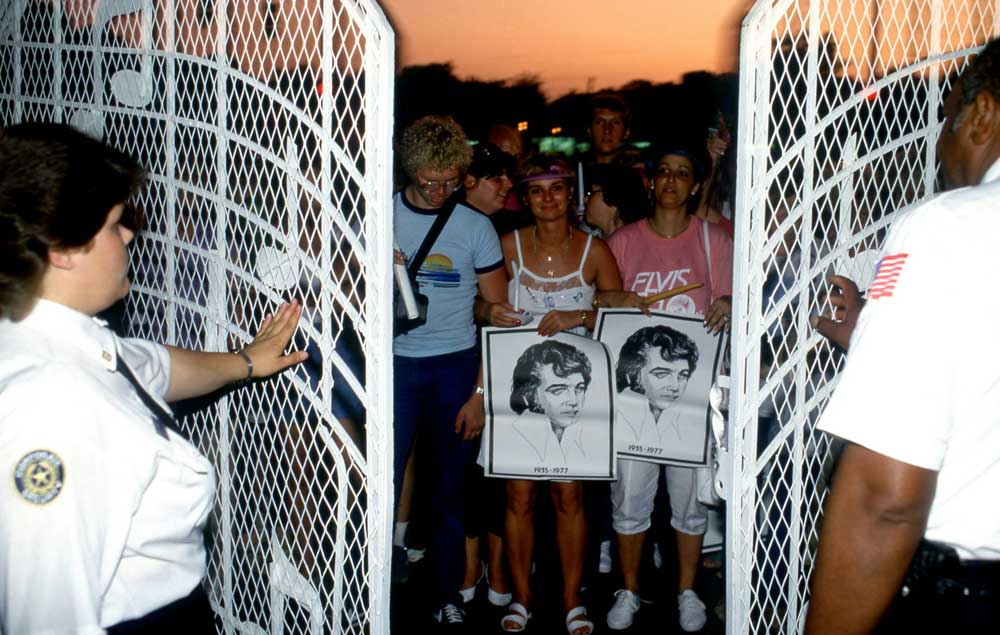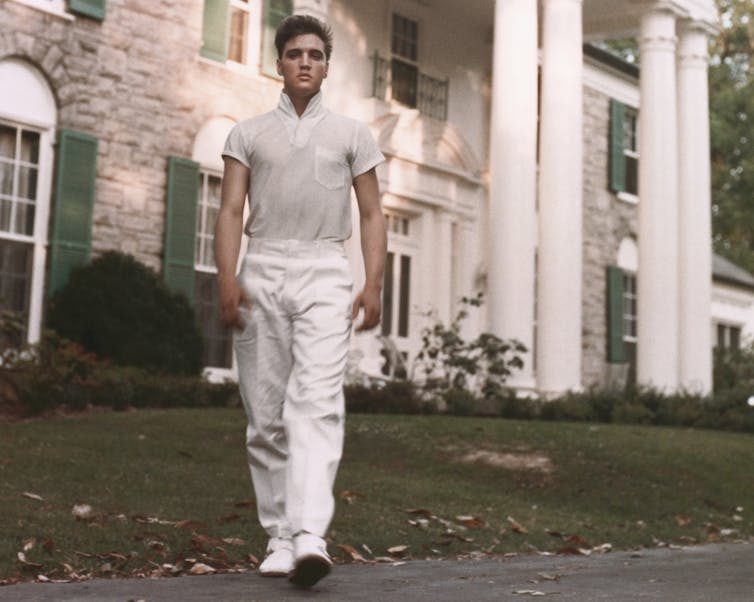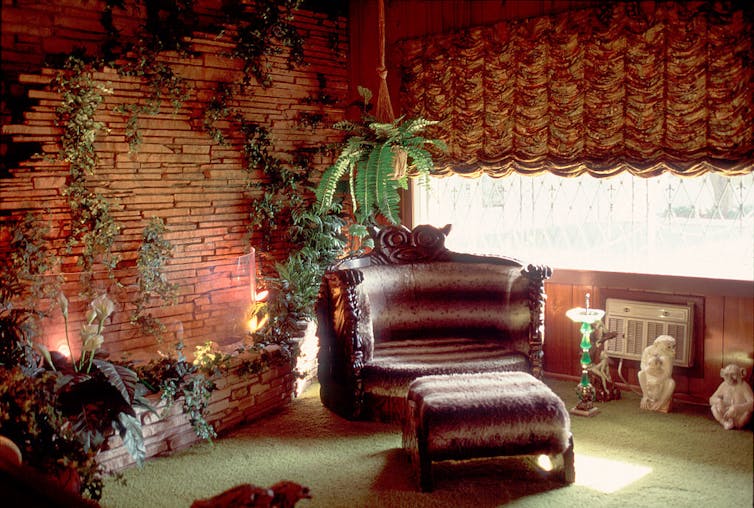
By Michael T. Bertrand
Nearly 50 years have passed since Elvis Presley died; save for an annual August observance to commemorate the anniversary of the singer’s death, most days produce little news about Presley or his estate, Graceland, which became a National Historic Landmark in 2006.
Fans, then, were unprepared in late May 2024, when a mysterious private investment company issued a public notice to foreclose on Graceland. The property appeared to have been used as collateral on a nearly US$4 million unpaid loan.
Suddenly, it seemed like a piece of history could disappear with the rap of an auctioneer’s gavel.
Many of the details of the episode are still unclear, though the courts suspected fraud and promptly suspended the sale. An identity thief later took credit for the attempted grift from the shadows of the dark web.
But the anxiety over the possibility that Presley’s home might fall out of family control raises an important question: Why does Graceland matter?
It’s the second-most-visited home in the U.S., topped only by the White House. According to the U.S. Interior Department, which granted Graceland landmark status, “American culture and music changed irreversibly because of Elvis. It would be difficult to tell the story of the 20th century without discussing the many contributions made by this legendary, iconic artist.”
The department’s account is certainly correct, but the saga of Graceland provides more nuance than the decree suggests.
In my two books on Presley, I argue that the singer did, indeed, make significant contributions to American society. However, at the same time, many have viewed the singer’s life, output and legacy with a sneer.
Nowhere is this condescension more evident than in patronizing references to his home.
From East Memphis to Whitehaven
Graceland wasn’t the first home Elvis bought.
In 1956, he purchased a house for his parents in an upper-middle-class suburb in East Memphis. The family had moved at least 16 times since Elvis’ birth, mostly into boarding rooms, subsidized apartments and rental houses.
At each stop, the Presleys were accustomed to bringing along their cultural mores.
At their new East Memphis address, this didn’t go over well with the neighbors, even though Elvis had become a superstar through his music, TV appearances and film roles.
Upon receiving notice from his well-to-do neighbors that they didn’t approve of his mother hanging out clothes to dry and raising chickens in the backyard, Elvis began looking for a home where he and his family would not suffer the injuries of social class.
In 1957, when he was just 22 years old, he settled on Graceland.

Michael Ochs Archives/Getty Images
Graceland had been built in 1939 as a 10,266-square-foot, two-story, five-bedroom, four-and-a-half bathroom colonial revival “mini-mansion,” four years after Elvis was born in a two-room East Tupelo, Mississippi, shotgun shack a few steps away from the family outhouse.
The estate was not a plantation, but it did encompass 13 acres of what had been a large cattle farm situated in Whitehaven, a hamlet located several miles from downtown Memphis and named after Colonel Francis White, who helped establish the Mississippi and Tennessee Railroad.
The Whitehaven neighborhood had developed in the late 19th century and attracted as residents the Memphis gentry. By the mid-1950s, real estate developers arrived and began subdividing formerly large estates. While still considered the “country,” it began to resemble a conventional middle-class suburb. At the end of the decade, Whitehaven and the adjacent Levi neighborhood were about two-thirds white and one-third Black.
In 1970, Memphis annexed Whitehaven. By the time the Memphis City Council in 1971 renamed the section of U.S. Route 51 that intersected the community as Elvis Presley Boulevard, desegregation and school busing spurred the arrival of new Black students, residents and businesses. This activated the white flight that eventually saw Whitehaven become a predominantly Black suburb.
Today, when tourists visit Graceland, they’ll find the “mini-mansion” situated in a predominantly Black community. Many of the associates who work at the tourist complex are Black.
A mood board of 1950s Americana
Immediately after moving into Graceland in 1957, Elvis began renovations. He added rooms, a swimming pool, a stone fence and the now-iconic wrought-iron gates emblazoned with musical notes.
As he did when he chose his attire, Elvis approached home decor with the verve of a true postwar American consumer. If he liked something he saw in a magazine, movie or TV show, there was a good chance a version of it would appear in one of the home’s 23 rooms.
Inspired by President Lyndon Johnson’s three television sets in the Oval Office, the singer placed the same number in his basement media center. Having spent a lot of time working and vacationing in Hawaii, Elvis redecorated a den with flagstone waterfalls, fake ferns and tiki-styled furnishings, while lining the floor and ceiling with green shag carpeting.

Paul Natkin/Getty Images
The overall result of Presley’s intuitive home design was a mishmash of furniture, decor and art of various styles and quality. Visitors expecting the grandeur of a luminary have been surprised by the house’s relatively modest size and its wholehearted embrace of the trappings of popular culture. (Prince Harry, apparently, wasn’t impressed when he paid a visit to Graceland.)
He never got above his raisin’
Graceland – flashy and unrestrained – personified Elvis.
He may have been the most successful performer of his generation, but the cultural establishment always saw him as an outsider: He was too provincial, too Southern for a mainstream conditioned, rightly or wrongly, to see the South in a negative light. Any success he attained was accompanied by an asterisk lampooning him as a “Horatio Alger in drawl.”
Elvis considered Graceland his refuge. It reminded him of his mother, Gladys, who died in 1958. It was where he was most comfortable in his Southernness, where he could just be himself without fear of being put down.
But he was also isolated. Elvis and Graceland exemplified a duality. They both reflected the rags-to-riches arc of the American Dream, yet each also exhibited cultural qualities that were never perceived as dignified enough.
Perhaps this duality can illuminate the cultural tensions that dominated the 20th century – and continue to do so in the 21st.
Many critics judge Elvis’s refusal to abandon a rural, working-class culture as backward and benighted, tempering his artistic success. In a nation whose story – at least the one told by polite society – emphasizes progress, Presley’s unwillingness to change was inexcusable, his indulgences in the latest gadgets or trends sneered at as ostentatious and tasteless.
Yet for many others, both inside and outside of the U.S., who struggle to balance the demands of tradition and modernity, of past and present, Elvis meant something else. They admire his attachment to home and family, and to an ethic to never get above your raisin’ – all while selling over a billion records.
Oh yeah, and he could carry a tune pretty well, too.
![]()
Michael T. Bertrand is Professor of History at Tennessee State University.





























Leave a Reply